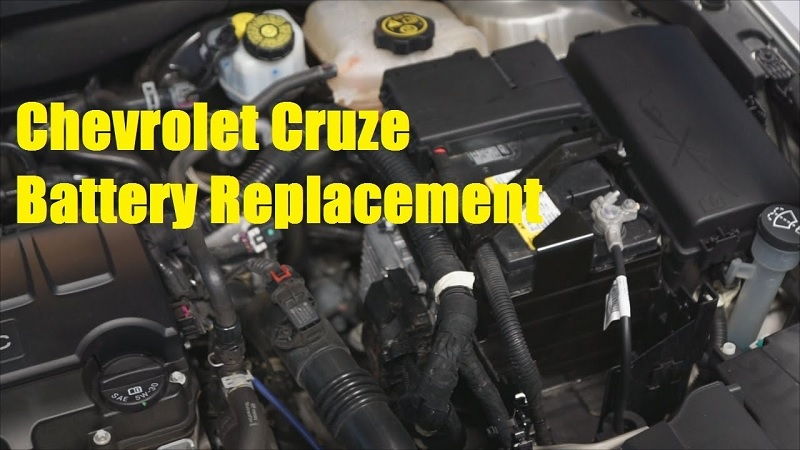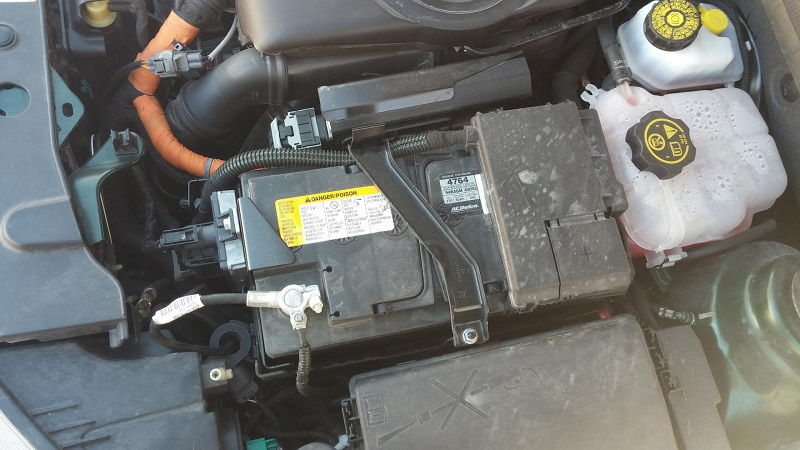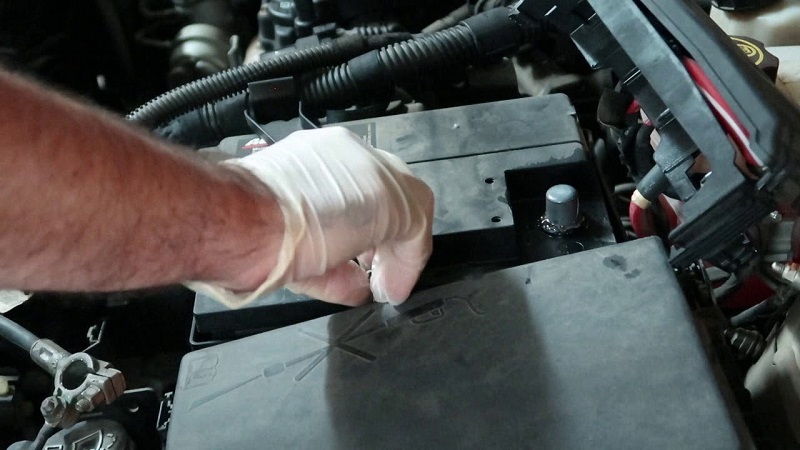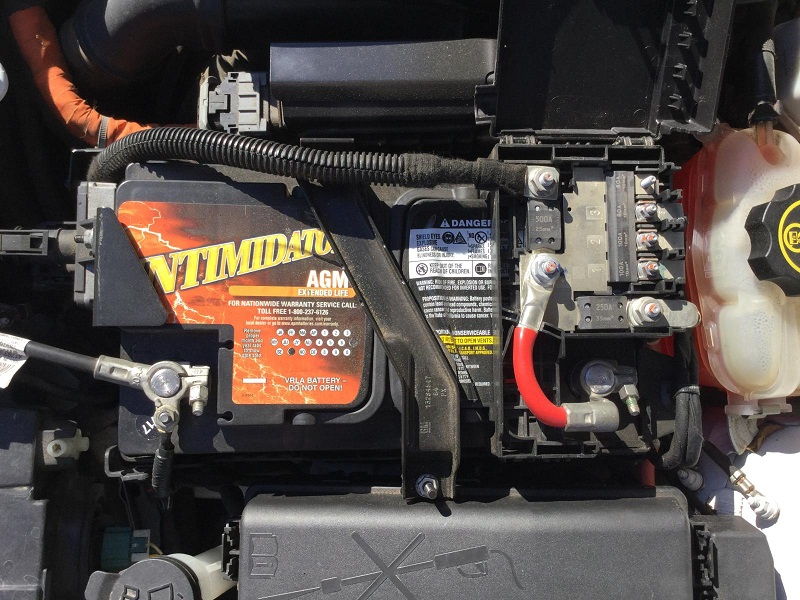This post contains affiliate links. This means I will make a commission at no extra cost to you should you click through and make a purchase [ “As an Amazon Associate, I earn from qualifying purchases.” ]. Read the full disclosure here.
2013 Chevy Cruze Battery GuideMechanic.Com Are you a proud owner of a 2013 Chevy Cruze? If so, understanding the ins and outs of your vehicle’s battery is crucial for its overall performance and longevity.
In this comprehensive blog article, we will delve into all the essential details about the 2013 Chevy Cruze battery, providing you with the knowledge you need to ensure smooth and hassle-free driving experiences. From its specifications to maintenance tips, we’ve got you covered.
Without further ado, let’s jump right in and explore the fascinating world of the 2013 Chevy Cruze battery!
The Importance of a Reliable Battery

A reliable battery is the heart of any vehicle, and the 2013 Chevy Cruze is no exception. Your battery powers essential systems within your car, such as the starter motor, ignition system, and lights.
Without a dependable battery, your vehicle may struggle to start, experience electrical issues, or even break down completely.
When it comes to the 2013 Chevy Cruze, having a battery that meets the required specifications is crucial.
See Also: Chevy HHR Battery Location
The recommended battery for this model is a Group 48 with a minimum Cold Cranking Amps (CCA) rating of 615. This ensures that your battery has enough power to start your car even in cold weather conditions.
Battery Specifications
The 2013 Chevy Cruze battery specifications are as follows:
- Battery Type: Group 48
- Minimum CCA Rating: 615
- Voltage: 12 volts
- Reserve Capacity: 110 minutes
By understanding the importance of a reliable battery and ensuring that your 2013 Chevy Cruze is equipped with the right specifications, you can enjoy a smooth and uninterrupted driving experience.
Signs of a Failing Battery

Recognizing the signs of a failing battery is crucial to prevent unexpected breakdowns and ensure the overall performance of your 2013 Chevy Cruze. Here are some common indicators that your battery may need replacement:
- Slow Cranking: If you notice that your engine takes longer to start or cranks slowly, it could be a sign of a weak battery.
- Dim Lights: Dim headlights or interior lights that flicker could indicate a battery issue.
- Electrical Problems: Malfunctions in your car’s electrical systems, such as power windows or radio, could be a result of a failing battery.
- Warning Lights: Pay attention to any warning lights on your dashboard, such as the battery or check engine light, as they could be indicating a battery problem.
- Old Age: If your battery is more than three years old, it may be nearing the end of its lifespan and should be inspected regularly.
If you notice any of these signs, it is advisable to have your battery tested by a professional to determine if it needs to be replaced. Addressing battery issues promptly can save you from inconvenient breakdowns and potentially expensive repairs.
Battery Maintenance and Care
Proper maintenance and care are essential to maximize the lifespan and performance of your 2013 Chevy Cruze battery. Here are some best practices to follow:
Regular Inspections
Perform regular visual inspections of your battery to check for any signs of damage or corrosion. Look for leaks, cracks, or bulges in the battery case. Additionally, examine the battery terminals for any buildup of corrosion or loose connections.
Cleaning the Battery
To clean your battery, start by disconnecting the negative (-) terminal first to avoid any electrical mishaps.
Mix a solution of baking soda and water and use a brush to scrub away any corrosion on the terminals and cables.
Rinse with clean water and dry the battery with a cloth. Finally, reconnect the terminals, starting with the positive (+) terminal.
Charging the Battery
If you have a battery charger, it is a good idea to keep your 2013 Chevy Cruze battery charged regularly, especially if you don’t drive it frequently or for short distances.
A fully charged battery ensures optimal performance and helps prevent sulfation, a common issue that can reduce battery life.
Protecting Against Extreme Temperatures
Extreme temperatures can affect your battery’s performance and lifespan. In hot weather, make sure your battery is well-ventilated to prevent overheating. In cold weather, consider using a battery blanket or insulator to maintain optimal operating conditions.
See Also: 2019 Jeep Compass Battery Type, Location, Replacement
By following these maintenance practices, you can prolong the life of your 2013 Chevy Cruze battery and reduce the likelihood of unexpected issues.
Jump-Starting a 2013 Chevy Cruze

Experiencing a dead battery can be a frustrating situation, but knowing how to jump-start your 2013 Chevy Cruze can save you time and money. Here’s a step-by-step guide:
Step 1: Safety First
Prioritize safety by parking both vehicles away from traffic and ensuring the parking brakes are engaged. Turn off all electrical components in both vehicles, including lights, radio, and air conditioning.
Step 2: Connect Jumper Cables
Connect one end of the positive (+) jumper cable to the positive terminal of the dead battery. Then, connect the other end of the positive jumper cable to the positive terminal of the assisting vehicle’s battery.
Connect one end of the negative (-) jumper cable to the negative terminal of the assisting vehicle’s battery.
Finally, connect the other end of the negative jumper cable to an unpainted metal surface on your 2013 Chevy Cruze, away from the battery.
Step 3: Start the Assisting Vehicle
Start the assisting vehicle and let it run for a few minutes to charge the dead battery.
Step 4: Start Your 2013 Chevy Cruze
Attempt to start your 2013 Chevy Cruze. If it starts successfully, let it run for a few minutes to charge the battery.
Step 5: Disconnect the Jumper Cables
Once your 2013 Chevy Cruze is running smoothly, carefully disconnect the jumper cables in the reverse order of how they were connected.
Remember, jump-starting a vehicle should only be a temporary solution. It is essential to have your battery inspected and, if necessary, replaced by a professional to prevent future issues.
Battery Replacement Guide
Over time, your 2013 Chevy Cruze battery may reach the end of its lifespan and require replacement. Here’s a step-by-step guide on how to replace your battery:
Step 1: Safety Precautions
Prioritize safety by turning off the engine and all electrical components. Engage the parking brake and ensure both vehicles are in a safe location.
Step 2: Locate the Battery
The battery in the 2013 Chevy Cruze is typically located in the engine bay, secured by a battery tray or bracket. Refer to your vehicle’s owner manual for the exact location and any specific instructions.
Step 3: Disconnect the Battery
Start by disconnecting the negative (-) terminal by loosening the nut with a wrench. Once the negative terminal is disconnected, proceed to disconnect the positive (+) terminal in the same manner.
Step 4: Remove the Battery
Depending on the battery’s securing mechanism, you may need to remove the battery tray or bracket using the appropriate tools. Once the battery is free, carefully lift it out of the vehicle and set it aside.
Step 5: Install the New Battery
Position the new battery in the battery tray, ensuring it is securely seated. Connect the positive (+) terminal first, tightening the nut with a wrench. Then, connect the negative (-) terminal in the same manner.
Step 6: Double-Check Connections
Ensure that both battery connections are secure by giving them a gentle tug. If they do not move, you have successfully installed the new battery.
See Also: 2016 Jeep Patriot Battery
Remember to dispose of your old battery properly by taking it to a recycling center or an authorized battery retailer.
Upgrading Your Battery
If you’re looking to upgrade your 2013 Chevy Cruze battery for enhanced performance or added features, there are several options to consider:
Higher Capacity Batteries
For those seeking longer battery life and increased power, higher capacity batteries with a higher CCA rating may be the right choice. These batteries provide additional reserve capacity and can handle more demanding electrical loads.
AGM Batteries
AGM (Absorbent Glass Mat) batteries are a popular choice for their enhanced durability, deep-cycling capabilities, and ability to handle high electrical demands. AGM batteries are also maintenance-free and have a longer lifespan compared to traditional flooded batteries.
Lithium-Ion Batteries
Lithium-ion batteries offer significant advantages, including lighterweight, longer lifespan, faster charging times, and higher energy density. However, it is important to note that lithium-ion batteries may require specific charging systems and may have a higher upfront cost compared to traditional lead-acid batteries.
Considerations for Upgrading
Before upgrading your battery, there are a few factors to consider. First, check your vehicle’s owner manual or consult with a professional to ensure compatibility with your 2013 Chevy Cruze. Additionally, consider your driving habits and specific power requirements. If you frequently use power-hungry accessories or live in extreme weather conditions, a higher capacity or AGM battery may be beneficial.
Lastly, weigh the cost-benefit analysis. While upgrading to a more advanced battery may have advantages, it is important to determine if the benefits outweigh the additional cost.
Battery Warranty Information
Understanding the warranty details of your 2013 Chevy Cruze battery is crucial for peace of mind. The battery warranty coverage may vary depending on the manufacturer and the specific battery model. It is important to refer to your vehicle’s owner manual or consult with a dealership to obtain accurate warranty information for your battery.
Coverage Duration
The battery warranty for the 2013 Chevy Cruze typically ranges from 36 months to 60 months, depending on the manufacturer. This means that if your battery fails within the warranty period due to manufacturing defects, you may be eligible for a replacement at no cost.
Terms and Conditions
It is important to read and understand the terms and conditions of the battery warranty. Some warranties may require regular maintenance, such as battery inspections or proof of purchase, to remain valid. Failure to comply with the terms and conditions may void the warranty coverage.
If you experience any battery-related issues within the warranty period, contact your dealership or the battery manufacturer to initiate a warranty claim. They will guide you through the process and provide assistance in resolving the issue.
Battery Recycling and Disposal
Proper disposal and recycling of batteries are essential to protect the environment and comply with local regulations. The materials in batteries, such as lead and acid, can be harmful if not handled correctly. Here are some tips for battery recycling and disposal:
Recycling Centers
Many local recycling centers accept used automotive batteries for recycling. These centers have the appropriate facilities to handle battery disposal safely. Check with your local municipality or recycling centers to find locations near you that accept used batteries.
Authorized Battery Retailers
Authorized battery retailers often have programs in place for battery recycling. They may accept used batteries for recycling when purchasing a new battery from their store. Check with your local battery retailers to see if they offer battery recycling services.
Environmental Impact
Improper disposal of batteries can lead to environmental pollution, as the chemicals and heavy metals can seep into the ground and water sources. By recycling your used battery, you contribute to minimizing the environmental impact and help conserve valuable resources.
Always handle used batteries with care, keeping them upright and avoiding any damage to the battery case. Do not dispose of batteries in regular trash bins or incinerate them, as this can lead to hazardous situations.
See Also: 2011 Kia Soul Battery: Size, Type & Replacement
Common Battery FAQs
Here are answers to some frequently asked questions about the battery of a 2013 Chevy Cruze:
Q: What is the average lifespan of a 2013 Chevy Cruze battery?
A: The average lifespan of a battery in a 2013 Chevy Cruze is typically around 3 to 5 years. However, factors such as driving conditions, climate, and maintenance practices can affect the lifespan.
Q: Can I replace my 2013 Chevy Cruze battery myself?
A: Yes, in most cases, you can replace the battery yourself. However, it is recommended to consult the vehicle’s owner manual or seek professional assistance if you are unsure of the process.
Q: Can I use a different battery brand for my 2013 Chevy Cruze?
A: Yes, you can use a battery from a different brand as long as it meets the required specifications for the 2013 Chevy Cruze. However, it is advisable to choose a reputable brand known for producing reliable batteries.
Q: How often should I have my battery inspected?
A: It is recommended to have your battery inspected annually or during routine vehicle maintenance. Regular inspections can help identify potential issues early on and prevent unexpected battery failures.
Q: What should I do if my battery light comes on?
A: If the battery light on your dashboard illuminates, it is an indication of a potential battery or charging system issue. It is advisable to have your battery and charging system inspected by a professional to determine the cause of the warning light.
Expert Tips for Optimal Battery Performance
To ensure optimal battery performance for your 2013 Chevy Cruze, consider the following tips:
Driving Habits
Avoid frequent short trips, as these can prevent the battery from fully charging. Whenever possible, take longer drives to allow the alternator to charge the battery adequately.
Extreme Temperatures
In hot weather, park your vehicle in shaded areas or use sunshades to prevent excessive heat buildup. In cold weather, consider using a battery blanket or insulator to maintain optimal operating temperatures.
Battery Tenders
If you store your 2013 Chevy Cruze for an extended period, consider using a battery tender or maintainer. These devices provide a low-level charge to keep the battery topped up without overcharging it.
Disconnecting Accessories
When your vehicle is parked for an extended period, disconnect any accessories that draw power from the battery, such as phone chargers or dashcams. This helps reduce unnecessary battery drain.
Regular Inspections
Make it a habit to visually inspect your battery regularly for any signs of damage or corrosion. Additionally, have your battery tested annually by a professional to ensure it is functioning optimally.
By following these expert tips, you can maximize the performance and lifespan of your 2013 Chevy Cruze battery and enjoy worry-free driving experiences.
See Also: 2012 Chrysler 200 Battery: Jump-Starting + Replacing
In conclusion, understanding the intricacies of the 2013 Chevy Cruze battery is essential for every owner. By familiarizing yourself with its specifications, signs of failure, maintenance requirements, and other crucial details, you can ensure a smooth and uninterrupted driving experience.
Remember to always prioritize safety and proper disposal when dealing with your battery. With the information provided in this comprehensive guide, you are now equipped with the knowledge to take care of your 2013 Chevy Cruze battery and keep your vehicle running at its best!
- Food Trucks for Sale in Las Vegas NV - July 4, 2025
- Food Trucks for Sale Near Me Ready to Use - July 3, 2025
- Used Food Trucks for Sale in New York - July 3, 2025

